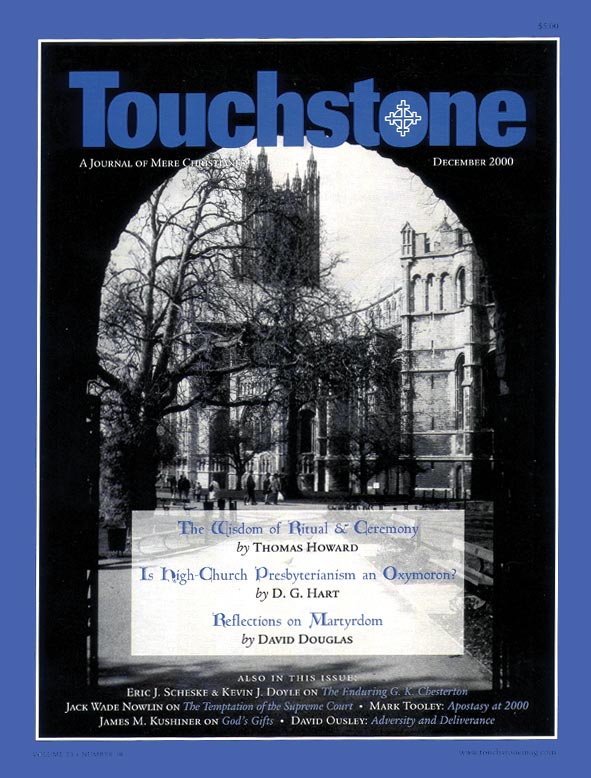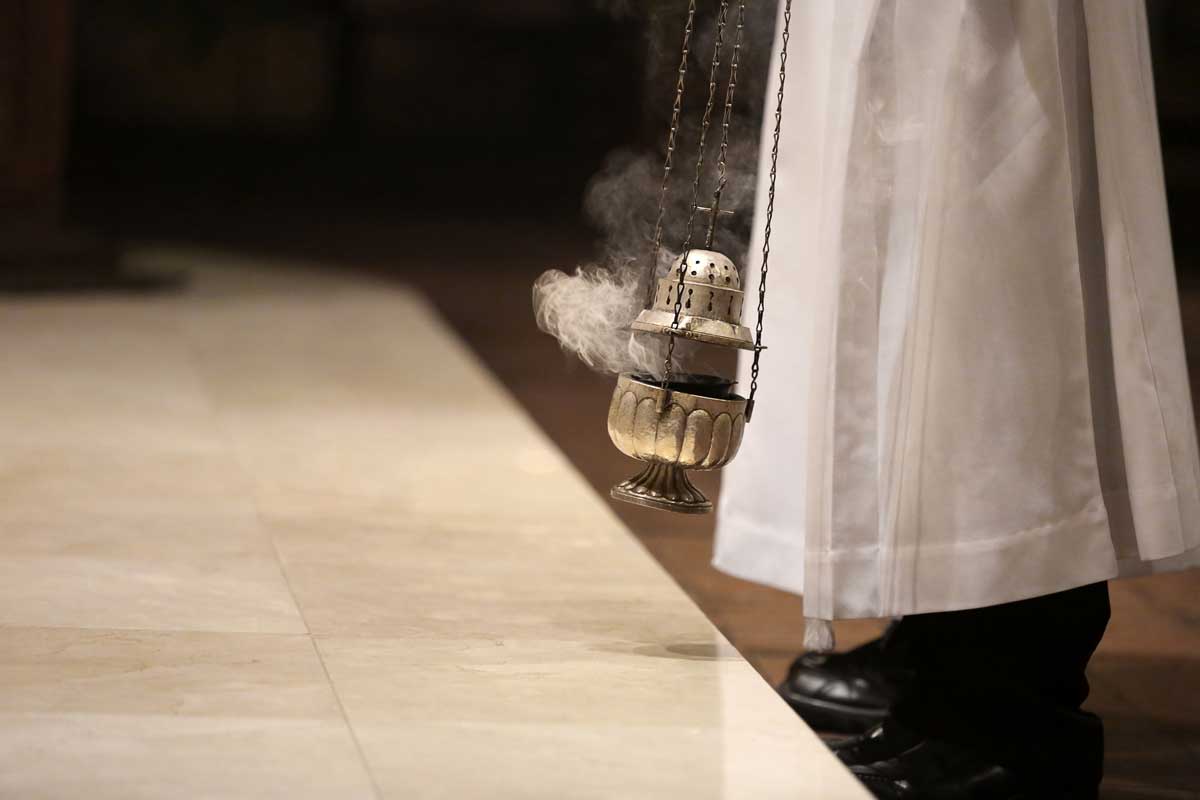The Power of Wise Custom
Thomas Howard on Ritual & Ceremony
Two words cast a pall over the imagination of those who have grown up since 1960—during this 40 years, that is, when spontaneity, naturalness, creativity, sincerity, and what we might call the visceral, have been so earnestly extolled. The two words are ritual and ceremony.
Spirits wither straightaway. “Dull!” we hear from one corner. “Repressive!” from another. “An imposition! A straitjacket!” we hear from various quarters. “What we want is freedom to be ourselves—our natural, real, unconstrained selves. Ritual and ceremony are guaranteed to stifle all vitality and genuineness. They are a recipe for ennui.”
Well, yes, we might say, your frantic objections are not altogether without warrant. But we need, clearly, to revisit the topic. If we leave things with those objections granted, we settle for an impoverishment of human life so tragic that famine itself is not too strong a word to bring into play.
Strong words, indeed, from all sides. What nerve have we touched, that we get this leaping response? What spot have we lanced that people recoil so? It is a matter, we begin to think, of challenging certain modern assumptions so deep that those who hold them feel threatened, and those of us (those few of us, it often seems) who reject them root and branch feel a certain desperation.
Our Floundering Century
Our century flounders along in the wake of the Promethean and Faustian romanticism that stole over the entire West from Germany in the eighteenth century (helped along a good bit by Rousseau). Prometheus was the Titan who (God love him) stole fire from Zeus because he saw us mortals shivering in the cold. Faust was the scholar who, finally bored with the usual academic fields, decided on magic, and made a pact with Mephistopheles, or Satan (Mephisto was only a lackey), to the effect that he could have his wishes if he signed over his soul to Satan for eventual disposal.
Prometheus and Faust became the heroes of everyone who wished to call his own shots, so to speak, to shape his own destiny free of meddlesome gods or moral codes. A spin-off from this center is the distrust of ritual and ceremony that is almost universal now, for a man who objects to ritual and ceremony is a man who would prefer to “do his own thing” rather than be clamped into a pre-ordered scheme.
This preference began to show itself extravagantly in the sixties and seventies. In clothes, for example. Costume and uniform have always borne great significance. They bespeak the occasion. A nurse on duty appears in starched, immaculate white (the idea being hygiene). A policeman on duty appears in blue, with a special hat (the London bobbies had the best ones), the idea being: Here we have a man with authority.
A housewife wore a “house dress” during her working hours—decent, but not “dressy.” Your dressy dresses (velvet, silk, and brocade) meant church, or the opera, or a dinner party. Men wore a suit, including waistcoat, stiff collar, necktie, and fedora, to work (look at any news photo up through the 1950s for proof). And of course tribal costume, regimental costume, royal attire, and priestly vestments would be the most colorful cases in point of ceremonial dress—dress, that is, prescribed by the identity of the wearer and the demands of the occasion (crowning a new king, or opening parliament, or going up to meet the gods).
This has all disappeared, as we know, or most of it. It lingers, of course, in a few contexts. But such contexts are dwindling. My son, for example, goes to work on Wall Street—certainly the last bastion of your man-in-a-three-piece-suit. Firm after firm is now permitting informal dress for the workday. I have not seen a nurse in white for, I suppose, thirty years.
Thomas Howard taught for many years at St. John's Seminary College, the Roman Catholic seminary of the archdiocese of Boston. Among his many works are the books Christ the Tiger, Evangelical Is Not Enough, Lead Kindly Light, On Being Catholic, and The Secret of New York Revealed, and a videotape series of 13 lectures on "The Treasures of Catholicism" (all from Ignatius Press).
bulk subscriptions
Order Touchstone subscriptions in bulk and save $10 per sub! Each subscription includes 6 issues of Touchstone plus full online access to touchstonemag.com—including archives, videos, and pdf downloads of recent issues for only $29.95 each! Great for churches or study groups.
Transactions will be processed on a secure server.
more from the online archives
calling all readers
Please Donate
"There are magazines worth reading but few worth saving . . . Touchstone is just such a magazine."
—Alice von Hildebrand
"Here we do not concede one square millimeter of territory to falsehood, folly, contemporary sentimentality, or fashion. We speak the truth, and let God be our judge. . . . Touchstone is the one committedly Christian conservative journal."
—Anthony Esolen, Touchstone senior editor











